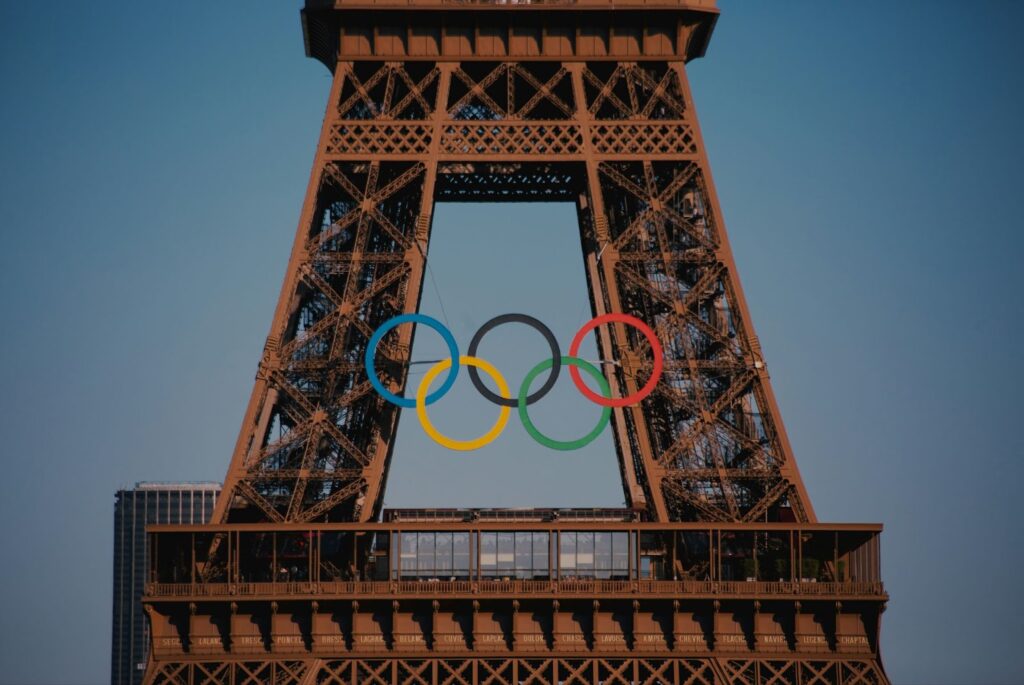
Hawk downs, redemption stories, and photo finishes, if nothing else, Team USA’s female athletes brought dominant energy to the Paris Olympic Games this year. They came in with resolve and left with the numbers to back it up.
The influx of attention to women’s sports in 2024 follows Caitlin Clark and Angel Reese’s record-breaking rookie performances in women’s basketball, making it only natural that the 2024 Paris Olympic Games would follow suit.
The Paris Games kicked off with first-time Olympian, Coco Gauff, setting the pace on the Seine River and introducing Team USA alongside LeBron James. Simone Biles closed out the Paris Games as Team USA’s flag bearer, after finishing the games with three gold medals and one silver.
Surrounding her on that last night in Paris were the many women who brought home 67 percent of Team USA’s medals, made history in various events, and gave America the edge over the rest of the world on the athletic stage.
The women of Team USA have been fairly consistent in their performances in sports like track and field, basketball, and swimming. What set this year’s games apart was the excitement and visibility that followed each athlete overseas.
With social media and increased investment into the personal lives and journeys of these athletes, this year’s games brought viewers inside the sport and the struggles that come with it.
Ilona Maher, a Team USA women’s rugby player, has built a large TikTok following over the past few years with her humor, uplifting messages, and candid sharing about rugby culture. This year she made her Olympic debut and helped Team USA make their way onto the podium.
Other athletes like Suni Lee, Tara Davis-Woodhall, Trinity Rodman, Gretchen Walsh, and Anna Hall all took to TikTok throughout the games to share knowledge with their audience about their sports and training process but also to remind us that they are people who enjoy a good TikTok trend like anyone else.
Howard University Women’s Rugby coaches Leandria “Lele” Ates and Kimmon “MacGyver” Williams were among the viewers who were both impressed and proud of the women at this Olympics. As coaches and athletes, they recognized the layer that was peeled back from the athletes this year.
“It humanizes the sport and helps the world see that they are normal people,” Ates said concerning the influence of athletes like Maher who shared her story about the Olympics on TikTok.
Even beyond social media, interviews and documentaries help to humanize some of the most otherworldly talented athletes Team USA has ever seen, like Biles.
During the Tokyo 2020 Olympics, Biles, the reigning women’s gymnastics all-around champion, backed out of the final on the last day after mental health concerns.
At the time, this sparked controversy and questions about Biles’ ability and overall willingness to compete. More than three years later and just ahead of the Paris games, in a documentary series by Netflix titled “Simone Biles Rising”, Biles and her family were able to give context by sharing her therapy and self-care routine during her time in Paris on social media.
Female athletes have shown that the list of what they accomplish is leaps and bounds ahead of what was preconceived for them, and these games help to push that message even further.
“They exceeded the expectations…I want to see the drama, the performance, the competition, who can edge out a win,” Williams said.
The women of this year’s games not only made history but opened doors for young athletes to be transparent and responsible with balancing each intricate piece of their sport and their lives, changing the way audiences receive the game forever.
“There’s a shift right now.. the foundation was set a long time ago, not in terms of tenacity or athleticism but, the empowerment of women has changed… They are more cognizant of what their bodies can do and that shows that they can be the same caliber of athlete as their male counterparts,” Ates said.
These platforms, which help amplify the voices of our greatest athletes beyond what they do on the mat, track, court or field, have served as huge educators. They have diminished just some of the distance between those who tune in to enjoy and consequently judge, and those who tackle the tasks of being the best athletes on earth by reminding us that they are humans as well.
“What the women do is not an inferior product,” Williams said.
If these Olympic games, as well as the ongoing Paralympics, are not a testament to that, what is?
Copy edited by Camiryn Stepteau





















